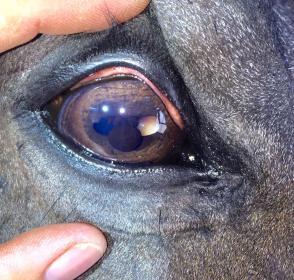My horse was ridden regularly without issue until last summer, when we had an accident together and he suddenly wasn’t doing anything for a few months (can be a trigger). He was mostly fine in November but occasionally tossed his head up and down at the walk and the trot. I didn’t know what it was. It wasn’t all the time. Never side to side. He was OK in the winter but it got bad enough in the spring that I inquired about it here. He shook his head enough up and down to get one rein over his ear, and he’d stop to rub his nose on his foreleg. He wasn’t really rideable for dressage schooling. Again, it was just up and down, and very sudden, like someone pricked his nose with a pin. He would press his nostrils into the fence when I groomed, which gave me a clue. In the spring, he also tossed his head when I groomed, so I thought it was related to allergies. He has a mild fly allergy making him itchy in the summer. I had my vet out and free-longed him in our round pen and she said “yep, that’s HSS”. At the time, he was doing it in the pasture occasionally, people say. I think he didn’t do it all the time because the grass touched his nose. He’s out 24/7 in his own pasture.
He tossed his head while grooming for maybe 2-3 weeks, then stopped. At this time, he hit his nose once pretty hard on the arena rail where I tack up so I knew it was an unexpected reaction to something he felt. I continued with the panty hose and then tried to ride between the panty hose and nose net. He seemed fine for about 15 minutes and then the HS started again. Up and down and very sudden, like someone just pricked him in the nose. I got off and put on the nose net. I’m not sure if it is seasonal and not even sure if I’ll try him again without the nose net. It works for him, he’s used to it, I carry on. I don’t see him vertically tossing his head in the pasture anymore, even when I catch him and he walks, trots or canters up to me (exercise can be a trigger). He also doesn’t do it when grooming anymore, so maybe it is seasonal. I’ll carry on with the nose net because it is easier for me and he’s used to it and I can show in it.
I’ll likely attach a nose net to his halter when it flares up so he’s not experiencing misfiring when i groom (he loooooooves to be groomed and I know his head tossing while being groomed was so out of character for him).
Seemingly, I’m in the lucky percentage where a nose-net stimulates the nasal trigeminal nerve endings and it stops HS. The nose net only works for horses with nasal trigeminal triggers. A nose net doesn’t work for every horse. Or even most horses. I think Cashel makes riding specific eye nets for horses who are triggered by sunlight. It is finer that the regular fly masks so horses can see yet blocks UV and might be worth trying. That works for some horses, but not most.
His pasture was recently analyzed for nutrient content and his diet was also analyzed. He has been above the recommended daily allowance for horses on pretty much all things, and isn’t really deficient in anything. Diet hasn’t been linked to HSS as far as I know. Age, sex, sudden let-down from work, and other mysterious correlations have been, although no one knows why.
My horse just started this a bit last fall and then this spring, so I can’t comment how well it will all work for 2 years.
I am a professional Ph.D. scientist and approached it with exactly the same questions you are. The triggers HAVE to be identifiable!!! I mean, why on earth is “let down” a trigger for a horse out 24/7? It doesn’t make physiological sense!!! Seemingly, the condition is more of a syndrome with likely many factors contributing to it. That there are so many “fixes” and so many “non-responders” to these fixes point to the fact that it is a syndrome. Unfortunately, there’s relatively little research done on the syndrome-I looked into the scientific literature. It’s really frustrating, but trial and error with your horse is going to be your best friend. Let us know how it goes!


